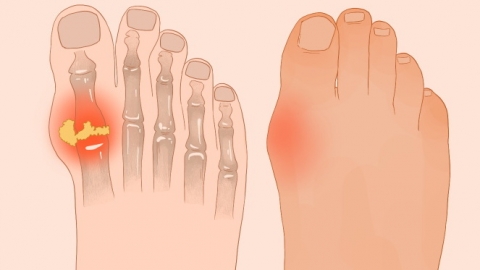What foods should be avoided in gout?
Generally, gout patients should avoid eating foods such as pork liver, beef soup, sardines, goose meat, and beer. They should also avoid taking medications such as aspirin enteric-coated tablets, hydrochlorothiazide tablets, nifedipine sustained-release tablets (II), pyrazinamide tablets, and levodopa tablets on their own, to prevent triggering or worsening gout. Detailed explanations are as follows:
I. Foods
1. Pork Liver
Pork liver is a high-purine food. Gout is associated with high levels of uric acid in the body. Uric acid is produced from the metabolism of purines. Consuming pork liver increases the amount of purines in the body, accelerating uric acid synthesis, which can easily lead to deposition of urate crystals in the joints, triggering an acute gout attack.
2. Beef Soup
Purines are water-soluble. After prolonged cooking, large amounts of purines leach into the broth, making beef soup a high-purine beverage. When consumed by gout patients, it can rapidly introduce a large amount of purines into the body, causing a sudden increase in serum uric acid levels, which may trigger symptoms such as redness and pain in the joints.
3. Sardines
Sardines are a typical high-purine seafood. The purines they contain are metabolized into uric acid in the body, increasing serum uric acid concentration, worsening the deposition of urate crystals in the joints and surrounding tissues, and exacerbating gout symptoms.

4. Goose Meat
Goose meat contains significantly higher levels of purines compared to common poultry meats. Consuming goose meat increases the purine load in the body, promoting increased uric acid production. Especially during the remission phase of gout, this may disrupt the balance of uric acid and trigger a recurrence of gout.
5. Beer
Beer contains purines, and alcohol inhibits the excretion of uric acid by the renal tubules while accelerating the breakdown of ATP in the body, indirectly increasing purine production. These dual effects significantly elevate serum uric acid levels, making it a key factor in triggering gout.
II. Medications
1. Aspirin Enteric-Coated Tablets
Low-dose aspirin inhibits the excretion of uric acid by the renal tubules, leading to uric acid accumulation and elevated serum uric acid levels, which may trigger gout. Patients with gout must consult a doctor before using this medication.
2. Hydrochlorothiazide Tablets
As a diuretic, hydrochlorothiazide reduces blood volume, lowers the glomerular filtration rate, and decreases uric acid excretion. Long-term use can easily lead to elevated serum uric acid levels and may trigger gout. Gout patients need to use alternative medications under a doctor's guidance.
3. Nifedipine Sustained-Release Tablets (II)
This medication belongs to the calcium channel blocker class. Some gout patients may experience impaired uric acid excretion after taking it, resulting in elevated serum uric acid levels. Patients with gout and hypertension should regularly monitor uric acid levels during use and adjust their treatment plan when necessary.
4. Pyrazinamide Tablets
As an anti-tuberculosis medication, pyrazinamide interferes with the excretion of uric acid by the renal tubules, reducing uric acid excretion and leading to elevated serum uric acid levels. Patients with concurrent tuberculosis and gout should use uric acid-lowering medications under a doctor's guidance and monitor uric acid levels.
5. Levodopa Tablets
Levodopa metabolizes into dopamine and other products in the body, which compete for the excretion pathways in the renal tubules, reducing uric acid excretion and leading to elevated serum uric acid levels. Patients with Parkinson's disease and concurrent gout should discuss medication adjustments with their doctor.
In daily life, patients should also maintain a low-purine diet, drink no less than 2000 milliliters of water per day to promote uric acid excretion, avoid staying up late and strenuous exercise, and seek medical attention promptly when necessary. Treatment should be conducted under a doctor's guidance, and self-adjustment of medications should be strictly avoided.




